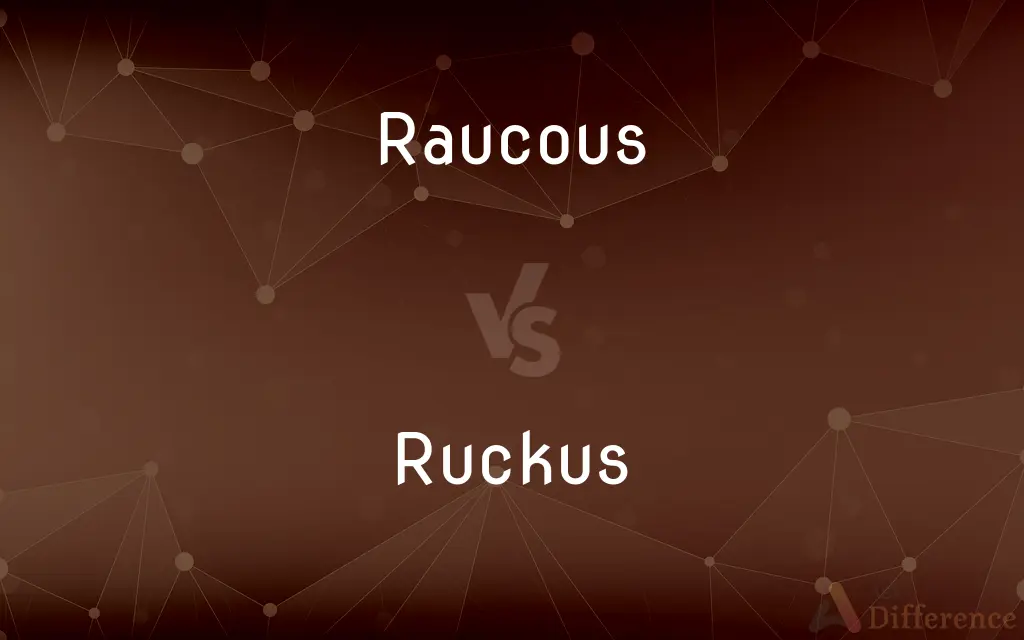Raucous vs. Ruckus — What's the Difference?
By Tayyaba Rehman — Updated on October 3, 2023
Raucous refers to a disturbingly harsh and loud noise, while Ruckus implies a noisy commotion or disturbance. Both denote disorder but differ as an adjective and noun, respectively.

Difference Between Raucous and Ruckus
Table of Contents
ADVERTISEMENT
Key Differences
Raucous and Ruckus, while synonymous with loud and disruptive scenarios, differentiate notably in their grammatical functionalities and usage contexts. Raucous, an adjective, delineates something or someone as boisterously disorderly due to its loudness or harshness, thus being descriptive in nature. Ruckus, on the other hand, as a noun, symbolizes the commotion or disturbance itself, embodying the actual event or scenario of uproar and tumult.
A sound that is raucous usually implicates an unpleasant, ear-splitting, and disruptive noise, providing a qualitative judgment about the type of sound being produced. The loud laughter from the party was incredibly raucous, clearly indicating its audibly jarring and abrasive quality. Contrarily, a ruckus refers directly to a noisy disturbance or upheaval, signifying the occurrence rather than describing it. The kids were making such a ruckus, indicating the discernable instance of boisterous activity.
In a social gathering, one might note the raucous laughter emanating from a specific group, pinpointing the boisterous and disruptive sound particular to that set of individuals. This implies that the nature of the laughter is loud, possibly unpleasant, or disruptively lively. Simultaneously, if the entire gathering descends into chaotic noise and activity, one might say that a ruckus has broken out, designating a particular situation or event of tumult and loud chaos, without necessarily describing its specific nature.
Encountering a raucous crowd at a concert, one identifies the crowd’s overall loudness and potentially disruptive energy, characterizing their collective demeanor. This contextually suggests a scenario where the crowd’s vibrant and loud nature is a prominent feature. Conversely, if the energy tips over into disruptive chaos or a riot, one would say a ruckus has ensued, connoting a scene where boisterous disorder becomes the defining event, without denoting its particular attributes.
In musical terms, a band might produce raucous sounds, insinuating that their music leans toward being overwhelmingly loud or harsh, defining the musical style or output. This serves to describe the kind of music or sound being made by the band. A concert, on the contrary, might create a ruckus in a neighborhood, suggesting an occurrence or event wherein the loud and lively music and crowd noise become a noticeable disturbance, illustrating the event rather than its sound.
ADVERTISEMENT
Comparison Chart
Part of Speech
Adjective
Noun
Refers to
Describes the quality of noise
Refers to an incident of noise or disturbance
Example Usage
Raucous laughter
Making a ruckus
Implies
Harsh, loud noise
Noisy commotion or disturbance
Contextual Application
Qualitatively describes noise
Embodies an event of noisy disturbance
Compare with Definitions
Raucous
Disruptively noisy or loud.
The raucous crowd cheered loudly.
Ruckus
A noisy commotion or disturbance.
The children made a ruckus in the yard.
Raucous
Boisterously disorderly.
The raucous party lasted all night.
Ruckus
A scene of noisy confusion or activity.
The cats caused a ruckus at night.
Raucous
Unpleasantly loud and grating.
The band's raucous performance was criticized.
Ruckus
A disruptive uproar or fuss.
The announcement caused a ruckus in the office.
Raucous
Harsh and loud in sound.
The raucous music irritated the neighbors.
Ruckus
A turbulent public disturbance.
A ruckus ensued in the square.
Raucous
Raucous was a live, half an hour, RMITV program broadcast on C31 Melbourne featuring youth-oriented segments, arts reviews, comedy skits, interviews, street talks and live music. It was co-hosted by Lyndon Horsburgh and featured segments with Hamish and Andy's Hamish Blake and Andy Lee.
Ruckus
A rowdy or noisy disorder.
The fans created a ruckus after the match.
Raucous
Rough-sounding and harsh
Raucous laughter.
Ruckus
A disturbance; a commotion
"They had shut the dogs into the cowshed to keep them from causing a ruckus" (Molly Gloss).
Raucous
Boisterous and disorderly
"a drunken and raucous party for his bachelor friends" (Louis Auchincloss).
Ruckus
A noisy disturbance and/or commotion.
Raucous
Harsh and rough-sounding.
At night, raucous sounds come from the swamp.
Ruckus
A row, fight.
Raucous
Disorderly and boisterous.
Acts of vandalism were committed by a raucous gang of drunkards.
Ruckus
The act of making a noisy disturbance
Raucous
Loud and annoying.
The new neighbors had a raucous party.
Raucous
Hoarse; harsh; rough; as, a raucous, thick tone.
Raucous
Unpleasantly loud and harsh
Raucous
Disturbing the public peace; loud and rough;
A raucous party
Rowdy teenagers
Raucous
Stridently loud and harsh.
Raucous laughter filled the room.
Common Curiosities
What part of speech is Raucous?
Raucous is an adjective.
Does Ruckus describe the type of noise?
No, Ruckus refers to the noisy disturbance itself, not the type of noise.
Can Raucous be used as a noun?
No, Raucous is strictly an adjective.
Can Ruckus be used to describe sound quality?
No, Ruckus signifies a noisy commotion, not the quality of sound.
Is Raucous used to refer to visual disturbances?
No, Raucous specifically relates to sound.
Can Ruckus be used to describe a sound?
No, Ruckus refers to the commotion itself, not its auditory qualities.
Can Raucous refer to a situation?
Raucous describes the nature of noise but doesn’t denote a situation.
Can Raucous denote a peaceful sound?
No, Raucous typically implies a loud, harsh, or disruptive noise.
What’s a synonym for Ruckus?
Uproar can be a synonym for Ruckus.
Is Ruckus an adjective?
No, Ruckus is a noun.
Can Raucous be used to describe a person?
Yes, if referring to the noise associated with them, e.g., a raucous individual.
Does Ruckus always imply negativity?
Not necessarily, Ruckus simply denotes a noisy disturbance, which could be positive or negative.
Can Raucous describe a type of commotion?
No, Raucous describes the quality of noise, not the commotion itself.
What’s a synonym for Raucous?
Strident can be a synonym for Raucous.
Can Ruckus refer to a specific sound?
No, Ruckus refers to a general noisy disturbance, not specific sounds.
Share Your Discovery

Previous Comparison
Minister vs. Administer
Next Comparison
Microcephaly vs. PinheadAuthor Spotlight
Written by
Tayyaba RehmanTayyaba Rehman is a distinguished writer, currently serving as a primary contributor to askdifference.com. As a researcher in semantics and etymology, Tayyaba's passion for the complexity of languages and their distinctions has found a perfect home on the platform. Tayyaba delves into the intricacies of language, distinguishing between commonly confused words and phrases, thereby providing clarity for readers worldwide.














































